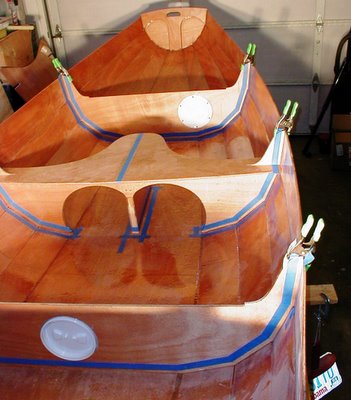 On a chilly winter morning in central Alabama, a novice boatbuilder of Polish decent drank coffee from Sumatran beans as he worked on a boat of Norwegian, er, Swedish (make it Scandinavian) design made of mahogany grown in west Africa, milled in France to British quality standards, and cut in Maryland, all while watching a frantic gold medal Olympic hockey game played in Italy by teams from Finland and Sweden. Who says the world isnt interdependent?
On a chilly winter morning in central Alabama, a novice boatbuilder of Polish decent drank coffee from Sumatran beans as he worked on a boat of Norwegian, er, Swedish (make it Scandinavian) design made of mahogany grown in west Africa, milled in France to British quality standards, and cut in Maryland, all while watching a frantic gold medal Olympic hockey game played in Italy by teams from Finland and Sweden. Who says the world isnt interdependent?After some scuff sanding yesterday at the positions for the bulkheads, I placed the three bulkheads in place for their permanent installation. Particular care was given to the center seat/daggerboard trunk unit to get the trunk aligned with the center line of the Passagemaker dinghy. Using an L-square, I laid down a strip of tape on the top surface of the center seat parallel to the centerline of the daggerboard trunk. This allowed me to align the unit with a string line running down the center of the hull. Fore and aft position was placed with measurements from the bow as specified in the instructions. The forward and aft bulkheads were placed in position with the help of the seat surfaces. Fitting the bulkhead "ears" through the slots in the seat, then positioning the seat with its respective transom put the bulkhead in position. The forward bulkhead angle relative to the bottom panel was adjusted with the help of the mast step support, which will be epoxied in place later. Since its angle with the bottom panel isnt 90 degrees, the stern bulkhead was adjusted to be roughly parallel to the stern transom. All three parts were clamped in place, and fit fairly well without further manipulation.
Then, along the joints that will soon be filleted with peanut butter epoxy, masking tape was laid down to keep a neat edge. I also made a few position marks with a felt tip marker to record the positions of the parts, in case anything gets shifted. In fact, the center unit will come out again so I can drill a small pilot hole to mark the interior of the DB trunk through to the exterior bottom hull. Also, epoxy will be applied to the surfaces of the DB trunk bottom, where they contact the hull. This joint will be one of the most critical to make strong and waterproof.
So, with the prep work done, it is time for a break. And another cup of coffee. Oh, and Sweden won the game, 3-2. Total hours 56.00.
0 komentar:
Posting Komentar